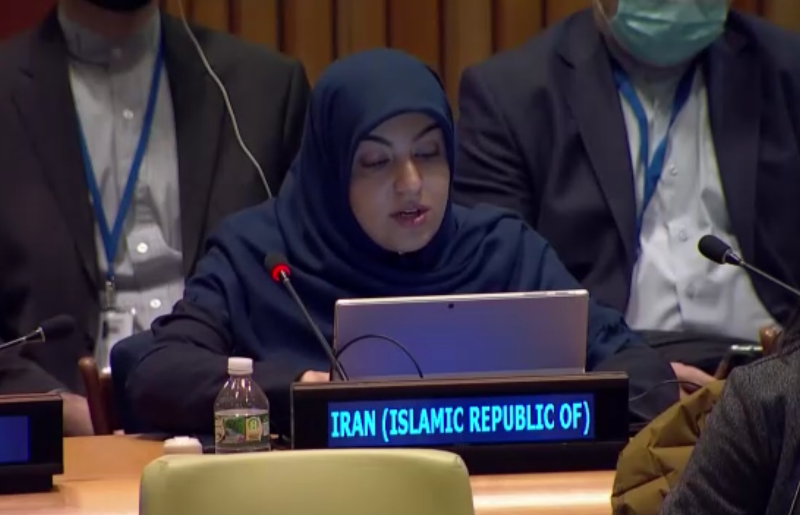America on the Spot as UN Expels Iran From Commission on the Status of Women
Will the Biden administration follow up in support of the protesters?

United Nations members took a small step Wednesday to address the horrors unfolding in the streets of Iran. Will America move further to help protesters overthrow the regime?
It’s no small thing that America gained enough support for an unprecedented resolution to expel the Islamic Republic from the Commission on the Status of Women. Washington and its Western allies, however, insist on pursuing a nuclear deal that would put the mullahs in the diplomatic driver seat and stand to enrich them.
With 29 countries in favor of the resolution to expel Iran, eight against, and 16 abstentions, the UN’s Economic and Social Council ended a farce in which one of the world’s worst violators of women’s rights sits on a body purporting to advance the rights of women.
The usual suspects — Russia, Communist China, Syria, and Venezuela — spoke passionately about how a vote to expel Iran would violate the world body’s procedures and would contradict the multilateralist ideal that underlines the UN’s deliberations.
Never mind that Iran was elected to sit in judgment of women’s rights only because of the UN’s Orwellian environment. As the Israeli ambassador, Gilad Erdan, describes it, Iran’s membership is “one of the lowest points of the UN’s institutionalized distortion.”
The Islamic Republic’s deputy ambassador at the UN, Zahra Ershadi, denounced the resolution. She reminded members that Israel, rather than Iran, is normally targeted in the commission’s deliberations.
It turned out, though, that enough countries realized the absurdity of Tehran lecturing anyone about women’s rights while its enforcers are killing women on Iranian streets.
“I urge you to keep this simple,” America’s ambassador, Linda Thomas-Greenfield, said. “Let’s do right by women and girls around the world. Let’s vote to remove Iran from the Commission on the Status of Women. Let’s do this for women. For life. And for freedom.”
“Women, Life, Freedom” has been the battle cry across Iran ever since 22-year-old Mahsa Amini was killed on September 16, 2022, while she was in custody of the morality police who seized her for improperly wearing her head covering. Amini’s death sparked a nationwide protest — at first against the mandatory hijab, but since then against the clerical regime itself.
While Washington and European allies are appalled by the oppression of Iranian women, they are too fearful to endorse the Iranian people’s demand to topple the regime. The West is yet to expel Iranian diplomats from capitals and is loath to end attempts at reviving nuclear diplomacy.
On Monday the Security Council is scheduled to conduct a periodic review of compliance with resolution 2231, which endorsed the 2015 nuclear deal known as the Joint Comprehensive Plan of Action. None of that deal’s original signatories are expected to declare that Iran’s numerous violations of the pact are substantial enough to end it.
Instead, diplomats endlessly repeat mantras about how diplomacy can best end the Islamic republic’s nuclear ambitions. “Everyone is much worse off” since President Trump left the JCPOA in 2018 “so now it’s urgent to come back to a full implementation of that agreement,” the European Union’s UN ambassador, Olof Skoog, told the National, an Abu Dahbi-based newspaper.
In reality, America and the Europeans are well aware that Supreme Leader Khamenei is uninterested in returning to compliance with the JCPOA. Western ambassadors to the UN complain in council meetings about Tehran, in violation of the nuclear deal, selling drones and missiles to Russia for use in Ukraine. Yet, these diplomats decline to trigger the snapback mechanism that would annul the JCPOA.
By the end of the decade, according to the JCPOA, all restrictions on Iran’s nuclear program are set to end. So are all international sanctions, which are already fast eroding. Meanwhile Iran now enriches uranium to 60 percent purity, blocks nuclear inspections, and materially breaches other provisions of the 2015 pact.
“There is more than enough ground to declare Iran in noncompliance” with the JCPOA “but there isn’t the political will to do anything about it,” the policy director at United Against Nuclear Iran, Jason Brodsky, tells the Sun.
Washington is concerned that any drastic move to shut down completely the nuclear diplomacy would be followed by a retaliation. The Islamic Republic could then enrich uranium to 90 percent purity, which is weapons grade. It could unilaterally leave the Nuclear Non-Proliferation Treaty, or even test a nuclear weapon.
Nevertheless, in lieu of a serious military threat or even meaningful diplomacy, Iran has been making nuclear advances and taking the initiative at every turn anyway. The West is meekly reacting, if at all, to Iran’s moves. “It would be helpful for President Biden to give a speech about America’s red lines,” Mr. Brodsky said. As yet, however, Mr. Biden is all but disinterested in taking any dramatic step that would rankle the mullahs.
Iranian protesters may be encouraged by the removal of their oppressors from a UN commission. But only once the West stops validating the regime by dangling diplomatic carrots to it, would the people know that we support their struggle to overthrow the regime.

